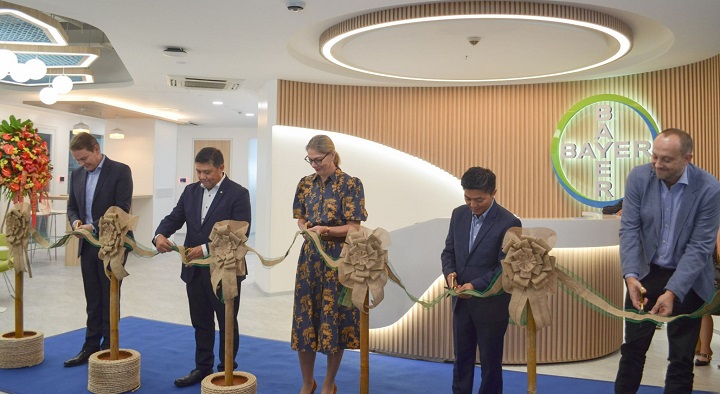Bayer officially opened its brand-new PHP 750-million office in the Philippines as it commemorates its 60 years of advancing health and nutrition in the country.

Located at Science Hub Tower 1 at McKinley Hill Cyberpark, Taguig City, the four-level, hybrid workplace, and future-oriented office brings together the central operations of its Crop Science, Pharmaceuticals, and Consumer Health divisions as well as its Global Business Services and enabling functions into one single location.
“We are celebrating our 60th year with a PHP 750-million new office investment from where we will continue to deliver our innovative products, solutions, and services for Filipino farmers, patients, and consumers. This is in line with Bayer’s vision of Health for All, Hunger for None,” said Angel Michael Evangelista, Bayer Philippines Managing Director, and Country Division Head for Pharmaceuticals.
Aside from serving the local market, the Philippines is also the base for the Consumer Health business in ASEAN. Manila is also a key location for Bayer Global Business Services (GBS) which supports business operations worldwide. GBS Manila is the largest site by headcount among a network of seven sites across the globe, bringing the total number of Bayer employees in the Philippines to over 1,800.
“This is the biggest office project of Bayer in ASEAN. Since Bayer started the global transformation program in 2021, over 70 projects at Bayer sites are adopting the next normal office concept. Coming out of the pandemic, five out of six main offices in ASEAN have completed this transformation,” said Ernst Coppens, Managing Director, and Chief Operating Officer of Bayer in ASEAN.
Flexible, collaborative, and inclusive hybrid working spaces
As a life science company and a global leader in healthcare and nutrition, Bayer is reshaping the conventional office model into a dynamic space enabling hybrid work while prioritizing collaboration and employee wellbeing.
Previously located in three locations in Metro Manila and Laguna, the new Bayer office in the Philippines is designed around Bayer’s Next Normal Office Concept (NNOC).
With spacious, and co-work style space, the office features a variety of formal and informal work areas with sit-to-stand ergonomic desks and chairs, stationary bike desks, stand-alone pods for individual calls or virtual meetings, and huddle spaces for quick group catch-ups. Meeting rooms of various sizes feature state-of-the-art video conferencing equipment to help employees easily collaborate with colleagues globally.
As Bayer fosters an inclusive and diverse workforce and culture, the new office has a multi-faith room, deaf-friendly safety alarms, braille on key signages, a mother’s room for nursing moms situated on two out of four floors, and gender-neutral toilets located on all floors.
Employees can also enjoy recreational facilities such as chess, air hockey, foosball, and sub-soccer tables located along employee locker hallways or in the Work Cafe, a dedicated game room and nap areas, plus a gym with free fitness classes.
Driving sustainability through its Bayer Kubo program
Bayer is also running sustainability programs in the country that combine the expertise of its Crop Science, Pharmaceuticals, and Consumer Health divisions to help address sustainability challenges around agriculture and health.
Its flagship Bayer Kubo program focuses on supporting smallholder farming communities in partnership with ASSIST Asia. It includes capacity-building programs around reproductive health and family planning, self-care, nutrition, and agri-oriented financial management and best practices.
“With the growing role of women in Philippine agriculture, who are often challenged to care for both the home and the field, we’re supporting women farmers, farmers’ wives’, their families, and the community through various initiatives around health, wellness, and sustainable agricultural practices,” said Evangelista.
The program aims to empower over 100 women farmers, as community champions that will ensure continued knowledge sharing and capacity building to train additional 1,500 community members on the best practices of family planning, farmer self-care, and smallholder farmer support.

